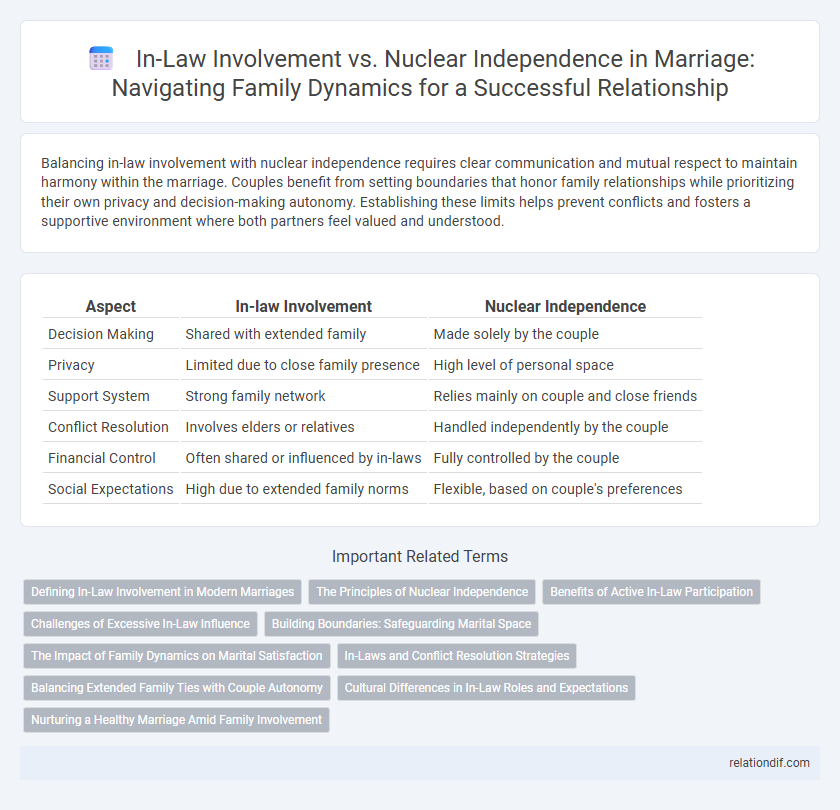Balancing in-law involvement with nuclear independence requires clear communication and mutual respect to maintain harmony within the marriage. Couples benefit from setting boundaries that honor family relationships while prioritizing their own privacy and decision-making autonomy. Establishing these limits helps prevent conflicts and fosters a supportive environment where both partners feel valued and understood.
Table of Comparison
| Aspect | In-law Involvement | Nuclear Independence |
|---|---|---|
| Decision Making | Shared with extended family | Made solely by the couple |
| Privacy | Limited due to close family presence | High level of personal space |
| Support System | Strong family network | Relies mainly on couple and close friends |
| Conflict Resolution | Involves elders or relatives | Handled independently by the couple |
| Financial Control | Often shared or influenced by in-laws | Fully controlled by the couple |
| Social Expectations | High due to extended family norms | Flexible, based on couple's preferences |
Defining In-Law Involvement in Modern Marriages
In-law involvement in modern marriages refers to the active participation and influence of spouses' extended family members in various aspects of the couple's life, including decision-making, child-rearing, and social events. This dynamic often shapes the balance between maintaining family traditions and fostering nuclear independence, where the married couple prioritizes self-governance and autonomy. Understanding the degree and boundaries of in-law involvement is crucial to navigating potential conflicts and ensuring a harmonious marital relationship.
The Principles of Nuclear Independence
The principles of nuclear independence emphasize maintaining boundaries and fostering autonomy within the core marital unit, allowing couples to develop their unique identity without excessive in-law interference. Prioritizing direct communication and mutual decision-making reinforces the couple's sovereignty, reducing potential conflicts arising from external family pressures. Establishing clear roles and respecting privacy supports emotional resilience and strengthens the marital bond by preserving the couple's self-governance.
Benefits of Active In-Law Participation
Active in-law participation fosters stronger family bonds and emotional support networks, enhancing marital stability and conflict resolution. Engaged in-laws contribute to shared child-rearing responsibilities and cultural traditions, enriching the couple's family experience. Their involvement promotes intergenerational connection and mutual understanding, vital for long-term relationship resilience.
Challenges of Excessive In-Law Influence
Excessive in-law involvement in a marriage often leads to boundary issues, creating tension and reducing the couple's autonomy in decision-making. Conflicts may arise from differing expectations about roles, financial matters, and child-rearing, impacting marital satisfaction. Maintaining a balance between extended family support and nuclear independence is crucial for preserving marital harmony and fostering healthy communication.
Building Boundaries: Safeguarding Marital Space
Establishing clear boundaries with in-laws is crucial for protecting the intimacy and autonomy of the nuclear family unit, preventing external interference in marital decisions. Prioritizing open communication between spouses enables mutual agreement on acceptable levels of in-law involvement, fostering respect and understanding. Maintaining these boundaries supports marital stability by reinforcing the couple's primary commitment and reducing potential conflicts caused by external pressures.
The Impact of Family Dynamics on Marital Satisfaction
Family dynamics significantly influence marital satisfaction, with in-law involvement often creating tension due to conflicting expectations and boundaries. Couples practicing nuclear independence tend to report higher marital satisfaction by establishing clear limits, fostering autonomy, and reducing external interference. Research highlights that balanced communication and mutual respect between spouses and extended family members are crucial for maintaining harmony and enhancing relationship quality.
In-Laws and Conflict Resolution Strategies
In-law involvement often presents unique challenges in marriage, requiring tailored conflict resolution strategies that prioritize respectful communication and boundary setting. Couples navigating extended family dynamics benefit from establishing clear expectations to mitigate misunderstandings and reduce tension with in-laws. Effective conflict resolution in this context includes active listening, empathy, and consensus-building techniques to foster harmony between nuclear families and in-laws.
Balancing Extended Family Ties with Couple Autonomy
Balancing extended family ties with couple autonomy requires setting clear boundaries that honor both in-law involvement and the couple's need for independence. Couples benefit from open communication and mutual respect to navigate expectations, ensuring that extended family support strengthens rather than undermines marital harmony. Prioritizing nuclear family decision-making empowers partners to maintain healthy relationships while embracing valued connections with in-laws.
Cultural Differences in In-Law Roles and Expectations
In-law involvement varies significantly across cultures, influencing marriage dynamics and expectations within families. For example, collectivist societies like India and China often emphasize strong ties and active participation of in-laws in decision-making and daily life, reinforcing family cohesion. In contrast, Western cultures such as the United States and Northern Europe prioritize nuclear independence, valuing privacy and emotional boundaries to foster autonomy in the couple's relationship.
Nurturing a Healthy Marriage Amid Family Involvement
Balancing in-law involvement with nuclear independence is essential for nurturing a healthy marriage, as excessive interference can strain the couple's autonomy and decision-making. Establishing clear boundaries and open communication helps in-laws feel respected while empowering the couple to maintain their core relationship dynamics. Prioritizing mutual respect and shared goals strengthens marital resilience amidst family influences.
In-law involvement vs Nuclear independence Infographic

 relationdif.com
relationdif.com